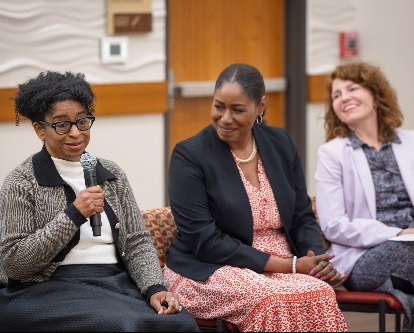
USC Brittingham Social Enterprise Lab Talks Transportation Equity Ahead of 2028 Olympics
Experts from the L.A. Metro and more discuss sustainability, accessibility, and community infrastructure improvements in Los Angeles.
It’s Time for Dodger Baseball
It’s Time for Dodger Baseball
USC Brittingham Social Enterprise Lab’s Undergraduate Scholars Program catapults mentorship to a summer of impact at the LA Dodgers Foundation.

The Los Angeles Dodgers Foundation (LADF) builds Dodgers Dreamfields to give families in neighborhoods across Los Angeles safe havens and points of pride.
In the middle of summer in downtown Los Angeles, it’s not just the temperature that’s rising. At Chávez Ravine, the Dodgers are working hard for a chance once again at the National League Championship.
But Dodgers Stadium represent more than just athleticism and history; it is a place of impact and progress, as led by the LOS ANGELES DODGERS FOUNDATION (LADF) and its CEO NICHOL WHITEMAN. A place of impact University of Southern California rising senior Russell Agustin has dedicated his summer to, in hopes of learning more about community-driven impact programs and how to make them sustainable, wide reaching and deeply resonant.
Agustin is a WARREN BENNIS SCHOLAR, and also participated in last year’s USC BRITTINGHAM SOCIAL ENTERPRISE LAB UNDERGRADUATE IMPACT SCHOLARS PROGRAM, which pairs social impact minded students with professional mentors. Agustin was one of two scholars who worked with LADF’s Whiteman.
On Whiteman’s mentorship, Agustin comments, “Despite being the CEO of a foundation that consistently blazes the trail for sports philanthropy and community engagement, she still makes the time to meet with me and to be a resource in navigating my career in social impact.”
In just the first few weeks of his summer internship with LADF, Agustin was able to take part in two major initiatives: the unveiling of two new DODGERS DREAMFIELDS in partnership with the City of Inglewood.
The newly renovated Dodgers Dreamfields will cater to children aged five to 12-years-old and teenagers from the Dodgers Dreamteam and local high schools.
Of the project, Agustin says: After months of planning, it’s inspiring to see our ideas and plans turn into a reality. This work reaffirms my personal alignment with the foundation’s mission and vision of leveling the playing field for all Angelenos. I’m excited to see what we’ll accomplish next!
To learn more about Agustin, Whiteman & BSEL Scholars, please see the Q&A below.
"As changemakers and entrepreneurs, we take it upon ourselves to sacrifice our wellbeing for the sake of our projects. And while advocacy and entrepreneurship require risk and sacrifice, our initiatives are doomed to fail if we do not account for our own wellbeing and for the wellbeing of the teams we work with."
— RUSSELL AGUSTIN '24
What kickstarted your interest in social impact work?
Agustin: My interest in social impact work started when I was six-years-old. During a family road trip, my family and I drove across the country to attend the USA Track & Field Cross Country National Championships. Along the way, we had the privilege of visiting a Native American reservation.
As a six-year-old, you know very little about the world and the climate of our society, but you can still pick up on things that just feel off. I immediately observed that kids my age were taking turns playing around with a single pair of athletic shoes. This was confusing to me, as kids in my own community could afford to switch out shoes every racing season for both cross country and track and field.
As I grew up, I was increasingly curious about connecting communities and bridging issues of accessibility toward basic necessities all while upholding my appreciation for the environment. During my freshman year of high school, I launched a 501(c)3 nonprofit called SOLE2SOUL which continues to be dedicated to promoting sustainability and social responsibility through the reuse and repurpose of athletic shoes.
What does it mean to you to be a mentor?
Whiteman: The great Jackie Robinson once said, “A life is not important except in the impact it has on other lives.” To be a mentor means serving as an advocate, an ally and a supporter. It means providing guidance and advice in a manner that is both delicate and forward. It means being a great listener and knowing when to help solve a problem or simply be a sounding board.
Mentorship is the gratitude that we extend for the benefits that we’ve experienced in our own journeys. It is an opportunity to share words of advice that include our personal experience while never minimizing the importance of allowing the mentee to learn important lessons on their own.
How does such mentorship further connect you to your work at Los Angeles Dodgers Foundation?
Whiteman: Serving as a mentor allows me to take a step back and view the Dodgers Foundation’s work through a different lens. It’s easy to become entrenched in the daily logistics of facilitating our award-winning programs. Serving as a mentor is an invitation to step back and view our efforts through the perspective of others. When I share my work with a mentee, they ask questions that inspire me to take a deeper dive into how we can truly breathe life into our mission.
What is the number one take away from your time with BSEL Scholars?
Agustin: We need to humanize social entrepreneurship. As changemakers and entrepreneurs, we take it upon ourselves to sacrifice our wellbeing for the sake of our projects. And while advocacy and entrepreneurship require risk and sacrifice, our initiatives are doomed to fail if we do not account for our own wellbeing and for the wellbeing of the teams we work with.
Whiteman: I have truly enjoyed mentoring Russell and he exemplifies what it means to absorb information and execute. He asks specific questions, he does the “homework,” and he acts. I was mentoring Russell at a moment where I was learning to lead a new generation. It’s been mutually beneficial, which is always what mentors and mentees should seek. As a mentor, I have learned more about the pressures of living in an era that stresses instant gratification. Our conversations have heightened my empathy. I share tactical solutions with Russell regarding strategies to achieve his professional goals.
I will always recall when Russell told me that he applied to serve as a Dodgers Foundation associate. I had shared the opportunity with Russell but wasn’t aware that he was applying. When he shared the news with me, I was beaming. Our associates program is just the type of development I had been encouraging Russell to seek given his career interests and areas of opportunity. I’m excited to see his growth.
What is the most important piece of advice you'd share with mentees like Russell?
Whiteman: We hear so much advice about working hard. And I absolutely agree that dedication is a key component to success. But I also encourage mentees to rest in totality: your mind and your body. Learn early to be comfortable asserting that your life is important. Sometimes it’s difficult to put ourselves first but you must. You have a right to take care of your physical and emotional health. You have a right to feel appreciated and supported.
As you soar and earn accolades, be proud of your roots. Many of the young people who I mentor come from working families who faced hurdles that test their endurance. Imposter syndrome will have us asking “Do we have what it takes to make it?” And the answer is “Yes, we do.” We are built to excel. We are built to win and we will. I use the word “we” because as much as mentees are inspired by my words, these affirmations are also a reminder to myself to continue striving while taking the time to celebrate the now and indulge in the rest that we all deserve.
What advice would you give fellow students regarding seeking mentorship, and identifying opportunities to learn as a foundation for career growth?
Agustin: What you put in is what you get out. If admitted, work to engage with your peers and your mentors, ask questions, don't be afraid to tell people that you have no idea what you are doing with your life and soak in insights from any and all meetings you will have in the program.
RELATED
USC Brittingham Social Enterprise Lab Talks Transportation Equity Ahead of 2028 Olympics
Experts from the L.A. Metro and more discuss sustainability, accessibility, and community infrastructure improvements in Los Angeles.
USC Brittingham Social Enterprise Lab and Greif Center Host Pitch Contest Aimed at Global Impact
At USC’s Hult Prize Competition, students presented ideas toward United Nations Sustainable Development Goals for a chance at $1 million.
USC Marshall Undergraduate Scholars Program Provides Mentorship to Inspire Careers in Social Impact
USC Brittingham Social Enterprise Lab links social impact professionals with students across campus for intensive mentorship workshop.
MBA Program Propels Alum to Olympic Dream
Julia Durham MBA ’22 credits Marshall’s MBA program for launching her toward the LA28 Olympic and Paralympic Games.
Jacobson Symposium Offers Sustainable Strategies for Fashion Customers and Creators
Experts in sustainability, secondhand styling, composting, and textiles shared lessons in being conscious consumers of fashion.
Ten Years of Social Good for Marshall Master’s Program
The MSSE Gala celebrates tenth anniversary of the program and honors impact of its alumni entrepreneurs.